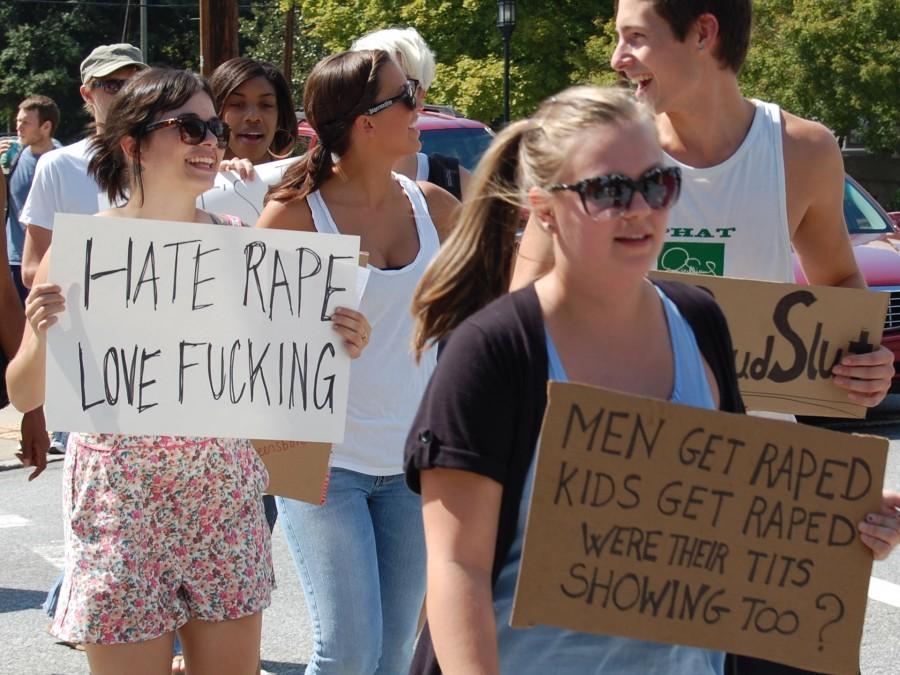In the bustling metropolis of Greensboro, one can find a multitude of people, clad in varying modes of dress and style, sprinkled here and there about the streets on a day-to-day basis. However, on Sept. 10, the streets were flooded with an unstoppable sea of sequined bras, skin tight skirts, and feisty fishnets. SlutWalk Greensboro had arrived.
SlutWalk was conceived early this year after Toronto police officer Michael Sanguinetti said, “Women should avoid dressing like sluts in order to not be victimized.”
Since its inception on April 3, SlutWalk has become a movement across countless countries as a call to action against sexual violence and a plea for women’s rights. The message of SlutWalk is that those who commit rape or other forms of sexual assault are fully responsible for their actions and it fights to remove the cultural notion that victims have a latent or indirect role in their own assault.
The movement has generated controversy over its name. According to Trish Kahle, one of the organizers and speakers, “(Slut) is a sexist word and I struggled a long time with the idea of reclaiming the term, but then I realized that’s not what this is about. What this is about is the fact that if a woman is raped and then called a ‘slut’ because she was raped, then all women are sluts. It’s not even tongue-in-cheek, it’s throwing the word back at the people who believe the victim ever has something to do with their own misfortune.”
Kahle’s sentiment was reflected in the signs displayed by protesters on Saturday, bearing slogans such as “It’s a dress, not a yes,” “Rape by definition never means asking for it,” “How I dress has nothing to do with you,” and others, some more colorful in nature.
Indeed, “sluttiness,” as it were, was in no way a requirement for participation and was secondary to the movement’s main message. Stephanie Sciascia, an organizer of the event, summed up her attitude towards the term: “Personally, I don’t identify with the word but if others do and they feel that it empowers them, then I’m for it.”
To become embroiled in the semantics of “slut” or “sluttiness” and to challenge the wisdom in framing the movement around a label applied to women by misogynists is to lose sight of the bigger picture. The message of the movement is to hold those who commit sexual assaults accountable.
“How a woman dresses is not why rape happens … It is deeply sad that it is still necessary for us to have these conversations,” said Julie Winterich, assistant professor of sociology and anthropology and coordinator of the women, gender, and sexuality studies program at Guilford.
The enthusiasm of the crowd was unwavering as SlutWalkers marched with impunity through the University of North Carolina at Greensboro campus and along Elm Street, eliciting more than a few quizzical looks from bystanders and many honks from both bemused and supportive drivers.
“SlutWalk was my first rally and now I’m hooked,” said participant Bailey Pittenger, a senior at Wake Forest University. “The turnout is great and there is such a diverse crowd and you can tell everyone here is very enthusiastic about this cause.”
The event was not attended by women alone.
“It is super important for men to be involved in this for two reasons,” said Binford Hall Director Justin Shreve ‘11. “One being that rape is not just an issue for women. It affects everyone. Secondly, by being involved, men can be a major pull in the distribution of awareness and de-stigmatization.”
Overall, the Greensboro movement served as a chance for SlutWalk’s message to be heard — through chants, signs, and slogans spoken by a vibrant and diverse group of people representing a multitude of ethnicities, genders, and sexual orientations.

